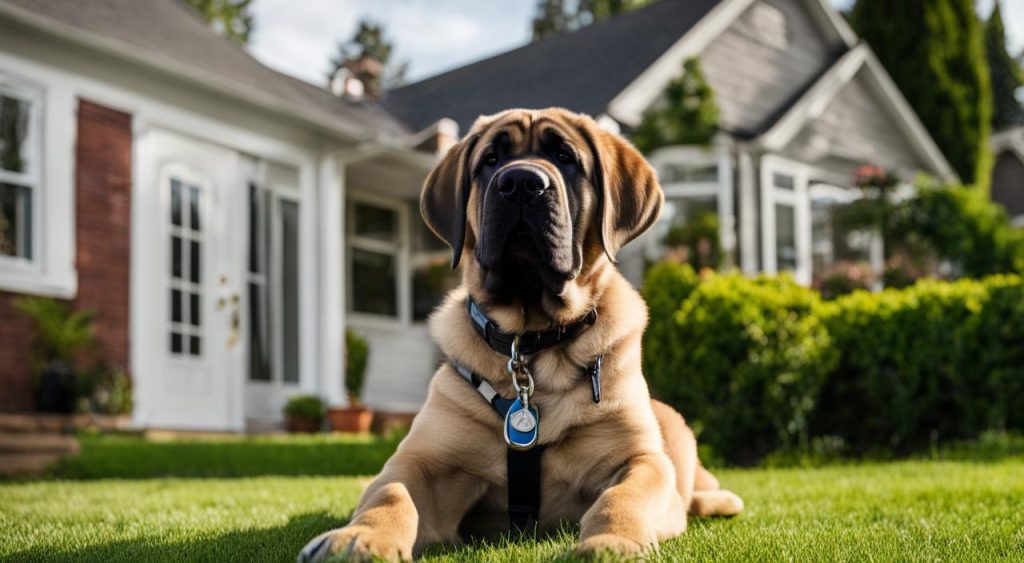The Mastiff breed, also known as the Old English Mastiff, has a rich history dating back to ancient times. They are known for their large size and kind nature, making them popular companions. However, like many giant breed dogs, Mastiffs are prone to several health issues that can affect their lifespan. It is important for Mastiff owners to be aware of these common health conditions and take proactive steps to manage their dog’s health effectively.
Key Takeaways:
- Mastiffs are prone to several common health issues
- Regular check-ups and screenings can help catch these health issues early on
- A well-balanced diet and regular exercise are essential for their overall health
- Veterinary care and pet insurance can help cover the cost of healthcare
- Proactive care and staying informed are key to ensuring their well-being
Common Health Issues in Mastiffs
Mastiffs are prone to several common health issues that can significantly impact their overall well-being and quality of life. It is crucial for owners to be aware of these potential health conditions and take appropriate measures to address them.
One of the common health problems in Mastiffs is allergies. These can manifest as skin allergies or food allergies and may lead to symptoms such as itching, redness, and gastrointestinal issues.
Mastiffs are also susceptible to various eye anomalies, including ectropion, entropion, cataracts, and progressive retinal atrophy. Regular eye examinations by a veterinarian are essential to monitor and address any eye-related concerns.
Cancer is another significant health risk for Mastiffs. Osteosarcoma, lymphoma, hemangiosarcoma, and mast cell tumors are among the common types of cancer seen in this breed. Early detection and prompt treatment are crucial for the best possible outcomes.
Hip dysplasia, a skeletal condition resulting in an abnormal development of the hip joint, is prevalent in Mastiffs. This condition may cause pain, lameness, and difficulty in mobility.
Another health issue that Mastiffs can experience is degenerative myelopathy, a progressive neurological disease. It affects the spinal cord, leading to weakness, paralysis, and loss of coordination.
Additionally, epilepsy, a seizure disorder, can occur in Mastiffs. These seizures can vary in frequency and severity, and it is important for owners to work closely with a veterinarian to manage this condition.
Gastric dilatation and volvulus (GDV), commonly known as bloat, is a life-threatening condition that can affect Mastiffs. It involves the stomach twisting and trapping gas, which can lead to severe bloating, discomfort, and potentially fatal consequences. Immediate veterinary intervention is necessary in cases of GDV.
To ensure the best care for your Mastiff, it is essential to be vigilant for signs and symptoms of these common health issues. Regular veterinary check-ups and screenings are vital for early detection and intervention. By staying proactive in their health management, you can provide your Mastiff with a healthier and happier life.
Care and Management of Mastiff’s Health
To care for the health of a Mastiff, it is crucial to prioritize their well-being through proper care and management. Here are some essential tips to ensure your Mastiff’s health:
1. Mastiffs health care: Provide a well-balanced diet specifically approved by the Association of American Feed Control Officials (AAFCO) for large breeds, ensuring they receive all the necessary nutrients to support their overall health.
2. Mastiffs health management: Feed your Mastiff multiple smaller meals throughout the day instead of one large meal. This helps prevent gastric dilatation and volvulus (GDV), a serious condition that is common in large-breed dogs.
3. Mastiffs health tips: Regular exercise is essential for maintaining their overall health and weight. However, it is important to avoid excessive exercise as it can strain their joints and potentially lead to injuries.
4. Mastiffs health maintenance: Make sure your Mastiff receives regular veterinary check-ups to monitor their health and detect any potential issues early on. Vaccinations and screenings for common health conditions should also be a part of their routine healthcare.
Investing in pet insurance is another option to consider, as it can help cover the cost of veterinary care and ensure your Mastiff receives the necessary treatments and interventions when required.
Conclusion
While Mastiffs have a higher risk of developing certain health issues due to their size and genetics, there are measures that can be taken to address these concerns. Regular veterinary care, including check-ups and screenings, is crucial for monitoring their health and detecting any potential problems early on. It is recommended to follow a well-balanced diet approved by the Association of American Feed Control Officials (AAFCO) and specifically formulated for large breeds to support their overall health and well-being.
In addition to proper nutrition, providing Mastiffs with regular exercise is essential for maintaining their weight and preventing certain conditions, such as hip dysplasia and degenerative myelopathy. However, it’s important to avoid excessive exercise, as their size can put strain on their joints. By finding the right balance, owners can help manage these health risks effectively.
Being proactive in caring for the health of your Mastiff is crucial. Staying informed about common health issues such as allergies, eye anomalies, cancer, and gastric dilatation and volvulus (GDV) can help you identify any potential symptoms and seek prompt veterinary care. By prioritizing their health through regular care, a balanced diet, and appropriate exercise, you can ensure that your Mastiff lives a happy and healthy life.





